イベント&アクティビティ
Joint DIJ & ICAS book talk The EU Migrant Generation in Asia
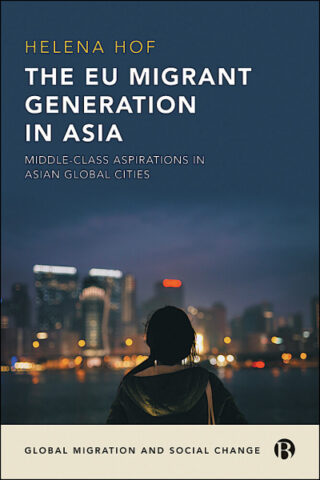
Jointly with the Institute of Contemporary Asian Studies (ICAS) at Temple University Japan, the DIJ sponsors the book talk The EU Migrant Generation in Asia – Middle-Class Aspirations in Asian Global Cities (Bristol UP, 2022) by Helena Hof. Hof’s book studies early-career migration by young Europeans and the changing outlook of Japan and Singapore. It shows how migration to Asian business centres has become a way of distinction and an alternative way of middle-class reproduction. Japan’s and Singapore’s changing migration regimes, however, pose different barriers to the migrants, which results in ambiguous feelings towards their host societies. Helena Hof is Senior Research and Teaching Fellow at the University of Zurich and a Research Fellow at the Socio-Cultural Department of the Max Planck Institute for the Study of Religious and Ethnic Diversity. The talk takes places on February 10 from 19:00-20:30 JST at Temple University Japan Campus. Registration is not required.
Celia Spoden presents research on ‘Telepresence Robots at School in Japan and Germany’
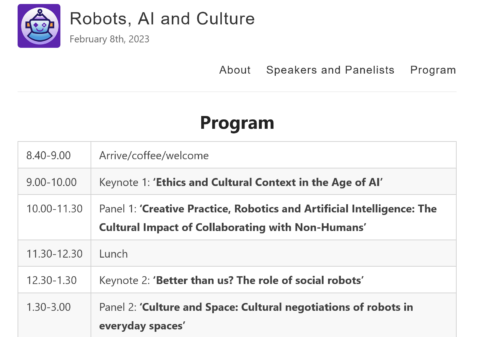
Together with Arisa Ema (University of Tokyo), DIJ social scientist Celia Spoden will give an online presentation on ‘Cyber-Physical Presence: Telepresence Robots at School in Japan and Germany’ in the panel ‘Culture and Space: Cultural negotiations of robots in everyday spaces’ at the Robots, AI and Culture symposium. The one-day symposium on February 8 is hosted by the University of Sydney and focuses on cultural translation, transference, and adoption of developing technologies in robotics and artificial intelligence. Celia’s co-authored paper on the use of telepresence robots in schools is based on a qualitative study that compares the Japanese case of the avatar-robot OriHime with the usage of AV1 in German schools. The avatar-robots aim to enable children who cannot attend school due to an illness, disabilities, or extended hospital stays to stay socially connected, restore normality, and prevent social isolation. Details and registration here
Barbara Holthus discusses Tokyo Olympics legacy at OAG lecture
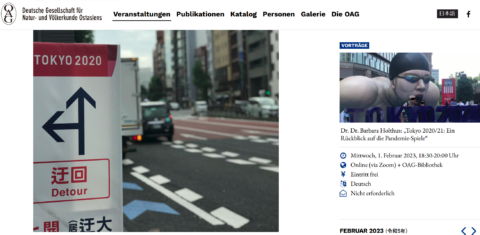
Since Tokyo won the bid to host the Olympic Games in 2013, the year 2020 was traded as both a “goal” and a “new beginning” in the country. To this end, the Olympic Games were instrumentalised in a variety of ways, including Tokyo as the capital of “Cool Japan”; the most technologically sophisticated Olympics; economic rebound; a new volunteer culture. In this talk on 1 February at the OAG Tokyo and online, DIJ deputy director and Olympic volunteer Barbara Holthus will contrast these efforts to reinvent the country and the instrumentalisation of the Olympics with what ultimately became of these lofty goals. What was Tokyo 2020/21 and what remains socially, economically, (infra)structurally? Barbara’s lecture also offers insights into the pandemic Games themselves through participant observation as “field cast” volunteers at the Paralympic Games. For more information on research related to the Olympics, see the DIJ’s special project on the Tokyo Olympics and the open access book publication Japan Through the Lens of the Tokyo Olympics.
Hybrid DIJ Study Group session on Digital Hermeneutics
 Perspectives from the history and philosophy of science have helped conceptualizing knowledge production in the digital humanities (DH). In the laboratory setting, the concept of the trading zone has proved to be fruitful. Arguing that DH tools can be considered as experimental systems in the sense of Hans-Jörg Rheinberger, this lecture aims at proceeding beyond the laboratory setting and embrace the heterogeneity of DH scholarship as an interdisciplinary field of research. Based on the results of a two-day workshop at the German Institute for Japanese Studies, the lecture will try to integrate perspectives on epistemic virtues from the Global South, most notably those reflecting the decolonization of our current knowledge infrastructure and economy. Details and registration here
Perspectives from the history and philosophy of science have helped conceptualizing knowledge production in the digital humanities (DH). In the laboratory setting, the concept of the trading zone has proved to be fruitful. Arguing that DH tools can be considered as experimental systems in the sense of Hans-Jörg Rheinberger, this lecture aims at proceeding beyond the laboratory setting and embrace the heterogeneity of DH scholarship as an interdisciplinary field of research. Based on the results of a two-day workshop at the German Institute for Japanese Studies, the lecture will try to integrate perspectives on epistemic virtues from the Global South, most notably those reflecting the decolonization of our current knowledge infrastructure and economy. Details and registration here
Andreas Fickers, Luxembourg Centre for Contemporary and Digital History/DIJ Tokyo
Barbara Holthus to give online talk on Pets in Pandemic Japan
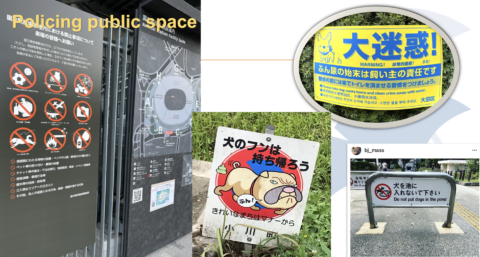
For almost three years, anti-Covid measures in Japan have told people to engage in physical distancing and “self-restraint”. During this time pets as “substitute” family members have gained added interest in order to fill the void in human-human interaction. In this presentation, DIJ deputy director Barbara Holthus will focus on the accelerated interest in pets and accompanying normative changes regarding pet ownership within Japanese society. Through interviews with pet owners and shelter organizations, as well as participant observation in pet shops, pet cafes, and at adoption fairs this presentation will highlight the changing role of pets in Japanese society and the particular role of the pandemic. Barbara’s talk “Pets in Pandemic Japan” is hosted by the University of Tokyo’s Center for Contemporary Japanese Studies and takes place online on Thursday, January 19, 9-10 am JST. Registration here
Martin Hemmert discusses non-internationalization of East Asian start-ups at DIJ online talk
 Western-based research on international new ventures suggests that start-ups are able to internationalize more easily than other types of firms, particularly in globally connected technology-intensive industries. This study of 40 IT start-ups in China, Korea, and Japan reveals that most of these firms do not internationalize successfully. It identifies a variety of factors that deter East Asian start-ups from internationalizing, including large domestic markets, general resource and capability shortages, insufficient international market knowledge, international adaptation costs, and non-supportive home and host country policies. Findings suggest that start-ups in East Asia may not necessarily face lower internationalization barriers than established firms. Details and registration here
Western-based research on international new ventures suggests that start-ups are able to internationalize more easily than other types of firms, particularly in globally connected technology-intensive industries. This study of 40 IT start-ups in China, Korea, and Japan reveals that most of these firms do not internationalize successfully. It identifies a variety of factors that deter East Asian start-ups from internationalizing, including large domestic markets, general resource and capability shortages, insufficient international market knowledge, international adaptation costs, and non-supportive home and host country policies. Findings suggest that start-ups in East Asia may not necessarily face lower internationalization barriers than established firms. Details and registration here
Martin Hemmert, Korea University/DIJ Tokyo
Online workshop on Abe’s Legacy for the Future of Japanese-Southeast Asian Relations

The assassination of former Japanese Prime Minister Shinzo Abe on 8 July 2022 stunned the world. As Japan’s longest serving prime minister (2006–07; 2012–20), Abe shaped the country’s politics like few of his predecessors. His political legacy is most visible in the arena of international politics. Abe introduced the idea of an Indo-Pacific region into geopolitical discourse and envisioned a foreign policy based on the rule of law, human rights, and democracy. Southeast Asia is the heart of this region. But the region’s countries also are diverse in terms of economic development, political regimes, and geopolitical positioning. This online workshop will explore the legacy of the Abe government from the perspective of Southeast Asian countries through case studies of their bilateral relations with Japan, including Indonesia (Bima Prawira Utama), the Philippines (Karl Ian Cheng Chua), Singapore (Kei Koga), Thailand (David M. Malitz), and Vietnam (Hoang Minh Hang). Details and registration here
DIJ Study Group with Giulia De Togni on ‘Caring Machines’
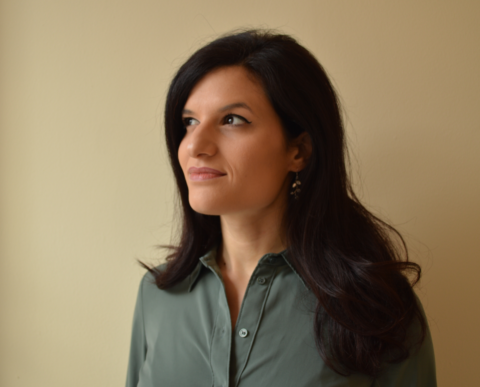 Robotics is a growing field in the delivery of care. “Socially Assistive Robots” (SARs) have the potential to ‘care’ for humans through social interaction, physical assistance, and therapy delivery. However, the emergence of ‘caring machines’ raises ethical, social, and technological questions. Giulia De Togni’s research aims to understand in what ways our identities and care relationships may be affected by the use of SARs and how this may vary in different cultural contexts. Her study is based on interviews with those who are developing robots, health and social care practitioners, and those receiving care; observations in robotics laboratories and care facilities in the UK and Japan – two rapidly ageing, highly industrialized countries which are leading in AI and robotics innovation. Details and registration here
Robotics is a growing field in the delivery of care. “Socially Assistive Robots” (SARs) have the potential to ‘care’ for humans through social interaction, physical assistance, and therapy delivery. However, the emergence of ‘caring machines’ raises ethical, social, and technological questions. Giulia De Togni’s research aims to understand in what ways our identities and care relationships may be affected by the use of SARs and how this may vary in different cultural contexts. Her study is based on interviews with those who are developing robots, health and social care practitioners, and those receiving care; observations in robotics laboratories and care facilities in the UK and Japan – two rapidly ageing, highly industrialized countries which are leading in AI and robotics innovation. Details and registration here
Giulia De Togni, The University of Edinburgh Medical School

















 Open Access
Open Access
